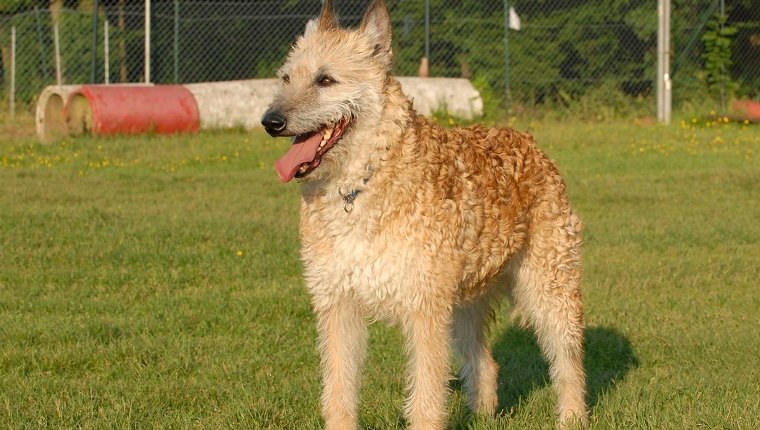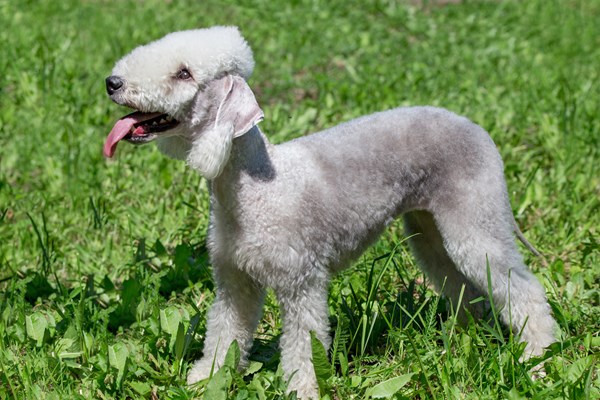Bordoodle Dog Overview
The Bordoodle is known as a cross between the Border Collie and the Poodle. The Border Collie gained popularity in the early nineteenth century and originated in the British Isles.
He was bred from numerous sheepdog breeds to become a great herding dog. If spoiled, the Poodle can be independent and will eventually become the alpha dog.
He is quite bright and playful, and when bored, he can be rather destructive. Bordoodles are excellent with children and are suggested for everyone from singles to senior adults.
He requires little activity and makes an excellent companion dog. He frequently has medium-length hair that is easier to maintain than either parent breed’s.
Bordoodle Highlights
- Bordoodles are a crossbreed dog. They are not purebred Border Collies or Poodles like their parents.
- Bordoodles have a wide variety of coat colors and patterns, typically combining black, white, gray, and brown.
- Bordoodles do not shed excessively. Brushing your dog on a weekly or biweekly basis should suffice.
- Although these canines are exceptionally intelligent, their intellect can occasionally manifest itself in destructive behavior if left alone or not adequately educated.
- Children and Bordoodles make an excellent pairing. By and large, there is no greater family dog than the Bordoodle. It is nevertheless necessary to supervise all children and pets during recreation.
- A couple of 45-minute walks per day should suffice to keep the dog happy and healthy. Although, due to the intelligence of the mixed breed, it is critical to integrate obedience activities into the training routine to keep the dog awake.
Bordoodle Breed Features & Ratings:
Rated base on a 5 Star Scale
ENERGY LEVEL: 4 Star
EXERCISE REQUIREMENTS: 4 Star
PLAYFULNESS: 5 Star
AFFECTION LEVEL: 5 Star
FRIENDLINESS TO DOGS: 5 Star
FRIENDLINESS TO OTHER PETS: 5 Star
FRIENDLINESS TO STRANGERS: 5 Star
WATCHFULNESS: 5 Star
EASE OF TRAINING: 5 Star
GROOMING REQUIREMENTS: 5 Star
HEAT SENSITIVITY: 5 Star
VOCALITY 5 Star
Bordoodle Characteristics:

- Dog Breed Group: Companion Dogs
- Height: 12 to 22 inches
- Weight: 30 to 60 pounds
- Life Span: 12 o 15 years
- Type: Crossbreed
- AREA OF ORIGIN: United States
- DATE OF ORIGIN: Unknown
- OTHER NAMES: Borderpoo, Borpoo, Borpoodle, Colliepoo
- Temperament: friendly outgoing playful willful aloof
- Activities: Agility, Obedience
- Color: black, gray, red, blue, cream, white, fawn, brown / chocolate / liver
- Litter Size: 4 to 10 puppies
- Puppy Prices: If you’re fortunate enough to come across a Bordoodle at a rescue, plan to pay between $250 and $375 to adopt the dog.
Bordoodle Health:
Bordoodles are typically considered healthy dogs; nonetheless, the mixed breed may be vulnerable to some of the same health problems as Border Collies and Poodles.
As is always the case, it is critical to arrange routine wellness checks with your dog’s veterinarian.
Several of the more common health problems encountered by Bordoodles include the following:
- Progressive Retinal Atrophy
- Epilepsy
- Hip Dysplasia
Bordoodle Grooming:
The Bordoodle comes in a variety of coat colors and patterns, typically combining black, white, gray, and brown.
The Bordoodle’s coat is characterized as silky to the touch and wavy. Shedding is minimal—brushing the dog once or twice a week should be enough.
In general, the Bordoodle is a climate-adaptive dog. Provide a proper dog coat if the weather appears to be getting too chilly and your canine appears to be cold.
Additionally, ensure that shade and fresh water are always available during outdoor play and activity periods during the hotter months.
Bordoodle Exercise:
Bordoodles thrive on modest activity. They do require exercise, at least twice daily, but not to the point of fatigue.
Indeed, one of the reasons they require a walk is to provide necessary cerebral stimulation.
Given that both of the Bordoodle’s parents are intelligent canines, the Bordoodle demands a plethora of puzzles and activities to occupy their minds.
Failure to do so risks the dog developing undesirable behaviors such as barking, digging, or destructiveness.
Certain exercises, such as agility, are particularly beneficial because they combine physical and mental exercise.
They like sprinting over obstacles and through tunnels, but also cherish the accomplishment of working cooperatively with their handler.
Bordoodle Training:
Consider the parent breeds’ characteristics to see that the Bordoodle can excel at obedience training.
Naturally, the Border Collie is recognized for its herding ability, which requires them to listen to their handler and respond appropriately.
Then there’s the Poodle, with its great intelligence and willingness to learn new tricks.
When handled with compassion and trained through reward-based approaches, the Bordoodle is a doggie delight.
Their enthusiasm to please and eagerness to learn make them a perfect option for competing in obedience training or participating in agility events.
Bordoodle Food and Nutrition:
A Bordoodle diet should be designed for a medium-sized breed with moderate energy levels.
Bordoodles must follow a healthy diet, since excessive eating can result in weight gain and associated health problems, even more so if appropriate activity is not provided.
As with all dogs, the Bordoodle’s nutritional requirements will change as they mature into adulthood and continue to do so into their senior years.
You should consult your veterinarian on your Bordoodle’s diet, as there is far too much variety between individual dogs in terms of weight, energy, and health to provide a specific recommendation.
Bordoodle Temperament and Personality:
When people describe their Bordoodles, they frequently emphasize how friendly and clever they are. This is accurate.
Generally, the mixed breed gets along well with families and enjoys becoming a part of daily activities and routines.
They’re content to relax and snuggle, but also to participate in play sessions with the children.
Due to the breed’s intelligence, they also respond well to instruction and enjoy mental stimulation, especially when given retrieve and herding-style duties to complete.
Just be aware that if the dog is left alone or is not properly trained, this same intelligence can occasionally manifest itself in harmful behavior.
Therefore, make the Bordoodle a major part of your family and enjoy a wonderful dog!
Additionally, keep in mind that the Bordoodle will immediately develop a protective attitude toward the family that adopts them.
While the mixed breed may not appear to be a traditional guard dog, they will be suspicious of strangers. This is a dog that is devoted to those that offer them affection.
Bordoodle Care/Upkeep:
It is critical to maintain your Bordoodle’s monthly veterinary exams in order to discover any health problems early.
Your veterinarian can assist you in developing a regimen for caring for your dog that will keep it healthy.
The Bordoodle is a medium-energy dog with moderate activity requirements. A couple of 45-minute walks per day should suffice to keep the dog happy and healthy.
Although, due to the intelligence of the mixed breed, it is critical to integrate obedience activities into the training routine to keep the dog awake.
Fortunately, the Bordoodle adapts well to apartment life, so there’s no need to be concerned if you live in an urban environment without access to large stretches of open space.
Brush your Bordoodle’s teeth daily, or at least a few times a week, when it comes to dental maintenance. Consult your usual veterinarian for advice on the proper way to perform canine teeth cleanings.
Additionally, inspect the mixed breed’s paw pads and nails weekly or biweekly for signs of damage and trim the dog’s nails every two weeks.
Ensure that you inspect their ears for debris or parasites and clean them as directed by your veterinarian.
Bordoodle Relationship with Children and Other Pets
Children and Bordoodles make an excellent match—just follow the typical requirements for adequate socialization and training of both children and dogs at an early age. However, there is no greater family dog than the Bordoodle.
In most cases, when it comes to existing household pets, the breed is acceptable. However, constantly supervise those initial exchanges and ensure that essential limits are established.
Finally, early socialization is critical with this breed. When you bring your Bordoodle home to your family, make sure to reward them for excellent behavior and to follow a suitable training regimen.
Bordoodle Names
| Rank | Boy Names | Girl Names |
| 01 | Charlie | Bella |
| 02 | Cooper | Lucy |
| 03 | Duke | Molly |
| 04 | Jake | Lulu |
| 05 | Zeus | Sadie |
| 06 | Tucker | Zoey |
| 07 | Cody | Stella |
| 08 | Bailey | Nala |
| 09 | Oliver | Coco |
| 10 | Harley | Gracie |
All About Bordoodle
The Bordoodle is known as a cross between a purebred Border Collie and a Poodle. Both in temperament and look, the Bordoodle is a nice cross between the two parents.
They are well-known for their friendliness and are unlikely to be aggressive.
Additionally, they are clever and seek guidance from their owner, rather than having independent spirits like some terrier blends.
The Bordoodle is an excellent canine companion for moderately active persons of all ages.
If a Bordoodle could advertise for their ideal pet parent, they would seek someone patient and kind who will train their pet using reward-based methods and will give their pet plenty of attention.
Additionally, they would need to spend some time caring for those long silky curls, teeth, and claws.
Bordoodle History:
Because the Bordoodle is one of the more recent dog breeds, there is little accurate information regarding its origins.
However, by studying the history of their parent breeds, one might begin to comprehend where the Bordoodle originated.
The origins of the Poodle breed date all the way back to ancient Egypt. Following that, the dog gained popularity as a duck hunting dog in France.
When it comes to the Border Collie, legend has it that Queen Victoria adored the breed, which is thought to be descended from British sheep-herding dogs.
The Bordoodle has developed a reputation as a designer dog breed, but sadly, many of them wind up in shelters.
Therefore, if you’re considering adding the Bordoodle to your family, contact your local rescue agencies and shelters.
Where to Adopt Bordoodle:
Due to their mixed breed status, it may be difficult to locate a breed-specific rescue for Bordoodles.
However, you may wish to contact Border Collie or Poodle breed-specific rescue organizations, as they frequently accept mixed breeds. Listed here are some possible rescues:
- Atlantic Region Central Border Collie Rescue, Inc.
- Carolina Poodle Rescue
More Dog Breeds and Further Research:
If you want to pet a similar breed, consider taking time to read about its parents!
Bordoodle Fun Facts:
- Bordoodles can inherit heterochromia from their border collie father, where one eye is blue and the other is brown. This has no bearing on her eye health, but it certainly gives her an air of coolness.
- It’s common to confuse a bordoodle with an Aussiedoodle, which is a cross between a poodle and an Australian shepherd. And that’s understandable, given how similar border collies and Australian shepherds seem!
- Bordoodles are occasionally referred to as borderdoodles, borpoos, and borderpoos. Which suffix you like is entirely up to you.
- Follow bordoodles such as Rosie, Molly and Dougal, and Griffey on Instagram to add a bit more cuteness to your timeline.
- Border Collies were once referred to as Scotch Sheep Dogs!
Frequently Asked Questions (FAQs):
Bordoodles makes for excellent family dogs. They’re friendly, love companionship, and will even become protective towards your family.
Border Terriers aren’t yappy, but they’ll bark to alert you of anything unusual, and they can become nuisance barkers if they get bored.




